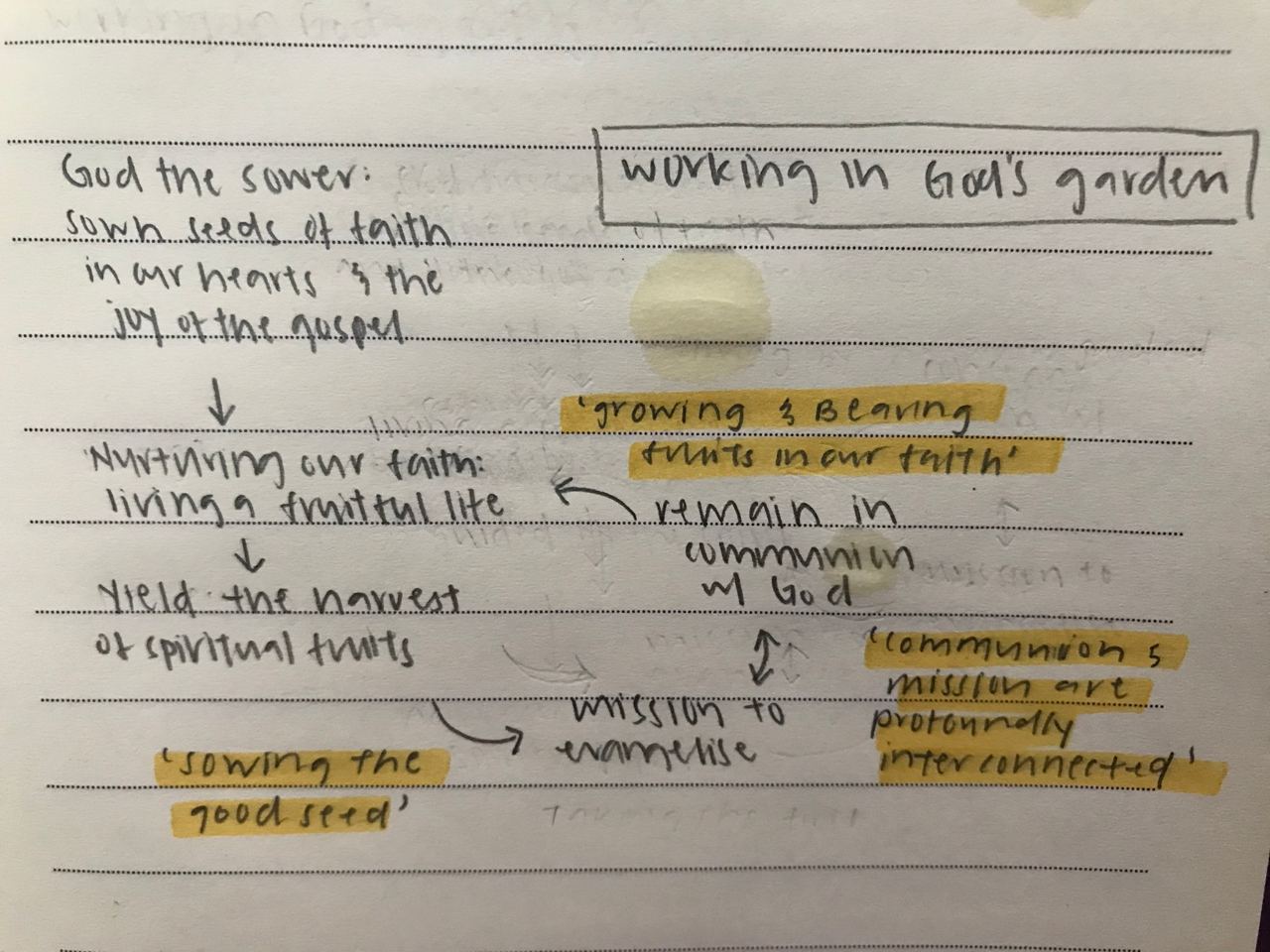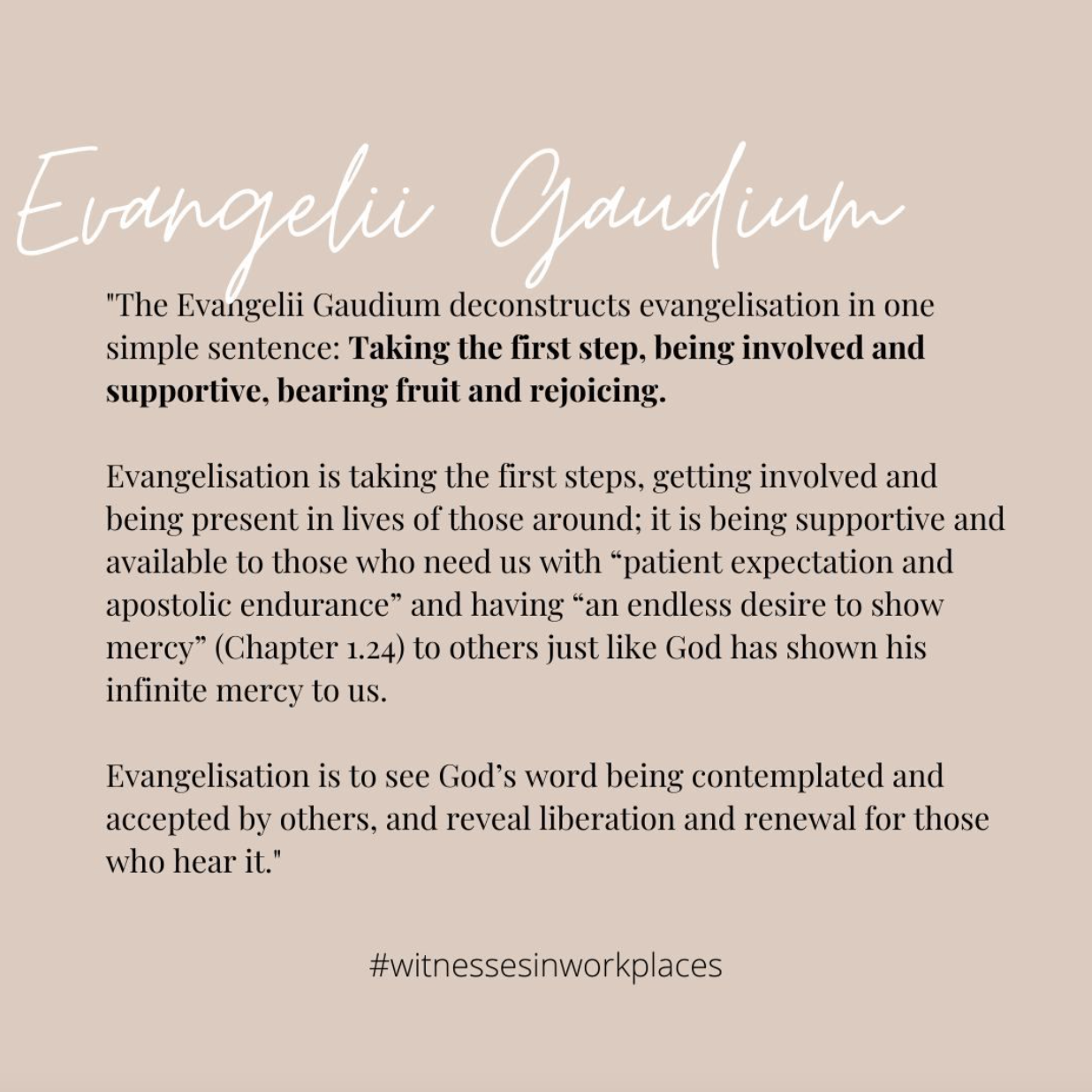
by Marie Charlene Garcia
In today’s highly competitive and fast-paced lifestyle, the hustle culture has become the norm for many in the workplace. The world tells us that this is the standard to objectively measure how ‘fruitful’ we are at work, that we have to be productive/successful in order for us to be ‘useful’ and ‘value-add’ to the company. When we start seeing our jobs through the world’s lenses, it is undeniably easy to have tunnel vision day in and day out, falling into this relentless rat race that we sometimes start questioning our self-worth and capabilities as we try to catch up with the hustle.
We start to compromise on our faith, sometimes in small, unnoticeable ways; such as exhibiting undesirable qualities towards the people around us when we are under stress and pressure. This is because sometimes it is more convenient to react and conform to the world in the present moment. The grace of remembrance becomes inconvenient, especially when your inbox is flooded with “pls fix thx” and “high importance: !” emails or demanding bosses/clients.
The duality comes into play when we are surrounded by life giving Christ-centred people. It seems as if our “Catholic mode” is suddenly activated and we all are devout, God-loving Christians on a mission to evangelise and transform the world. But the fire for God and His church seem to fizzle out when we are fighting bigger fires at the workplace. How then do we close this duality, to let this fire for God grow even brighter especially when it’s inconvenient to us? The Evangelii Gaudium, written by Pope Francis, explores the church’s missionary transformation. How we can realign our perception of what it truly means to be fruitful in this world and how can we evangelise in today’s hustle culture.
The Evangelii Gaudium brings our attention to the great danger in today’s world, that amidst the hustle our inner disposition becomes so caught up with our own self-interests in the present moment that we leave little to no space for God nor for the people around us (Chapter 1.2). When we start feeling the pressure at work, God’s voice feels a lot harder to hear and the quiet joy of His love feels distant and far away from us. When we start to feel distant from God, we start slipping into choosing what is convenient to us, reacting and acting in a certain way and try to justify our actions afterwards, or choosing to admit that it is a habitual sin, ask for forgiveness in confession and commit the sin again. As we become workers of the world, we get so consumed and preoccupied with being fruitful at work. We forget what it means to bear fruit in God’s name and that we are God’s workers in this world.
The recurring imagery in this chapter focuses a lot on bearing fruits and sowing the good seed (Chapter 1.21). Sitting on these images and pondering on the gospel brought to mind that as Catholics in the workplace, we need to consistently realign our disposition to the true meaning of bearing fruit. Are we toiling hard in God’s garden as much as we are working hard in our careers? Do we invest as much time nurturing and watering our plants of faith as much as charge our clients for the billable hours? Do we evangelise and talk about our faith as much as we do on our pitches? Putting my bad humour aside, God as the sower has already sown the seeds of faith in our hearts and we have received the joy of the gospel (Chapter 1.22), but God’s call for us is to live a life of fruitfulness.

The way to live a fruitful life is by living the way God intends for us to live. Saint Paul in his letter to the Galatians reminds us that God wants us to live by the spirit at all times and not just when it is convenient for us, in order for us yield a harvest of spiritual fruits of love, joy, peace, patience, kindness, generosity faithfulness, gentleness, and self-control; and in turn share these harvests with others through evangelisation (Chapter 1.24). For communion and mission are profoundly interconnected (Chapter 1.23), we cannot grow our relationship with God unless we go forth and evangelise. God challenges us to share the same gospel of joy and fullness of others, to nourish us and for us to grow in fruitfulness.
God’s challenge to us is indeed daunting. How do we proclaim the gospel in such a secular space without sounding like pushy salesmen/saleswomen for God? How do we evangelise with grace and conviction, and show how the gospel of joy has changed and continues to change our lives? The fear of evangelisation that many have arises from the fact that we are too focused on the ideal end goal of conversion. Oftentimes, we skip the initial but very crucial steps: by first spreading the joy of the gospel and letting others know about God because of the way we live and the values we live by. Evangelii Gaudium deconstructs evangelisation in one simple sentence: Taking the first step, being involved and supportive, bearing fruit and rejoicing. Evangelisation is taking the first steps, getting involved and being present in lives of those around; it is being supportive and available to those who need us with “patient expectation and apostolic endurance” and having “an endless desire to show mercy” (Chapter 1.24) to others just like how God has shown his infinite mercy to us. Evangelisation is to see God’s word being contemplated and accepted by others, and reveal liberation and renewal for those who hear it. While we may not always be successful in evangelisation as per the world’s standards, we cannot grow impatient at the weeds when tending God’s garden. We learn to rejoice the small victories in evangelisation as we accept “fruits of new life, however imperfect or incomplete these may appear”. As we become evangelising communities, we in turn also receive and are blessed in abundance as choosing communion with God nurtures our faith and realign our inner disposition towards heaven and its promises.
At the start of 2021, I boldly asked God for more – more joy, love, peace, trust – more of Jesus. I asked God to teach me what it truly means to be a disciple of Christ in all areas of my life, and upon prayer and reflection, the word for the year anchoring me is “fruits” (cf. Abiding Together podcast S09E01). It is no surprise why this chapter spoke to me so profoundly as I was reflecting on the teachings of the Evangelii Gaudium. Lately, the idea of being a Catholic out of convenience is something that has been on my mind as well.
As shameful as it is to admit, I am guilty of living out that duality. There is professional-Marie meant for the different stakeholders I engage with at work, and the personal-Marie that is meant for family and friends. Often, the duality is also present in my personal life, as I behave differently with my family and between different groups of friends and people. There is nothing fundamentally wrong with that because we do have to maintain some level of professionalism at work and the level of comfort varies across different groups of friends. However, the key question that I often ponder upon is, am I watering down my faith because it is more convenient to do so?

When we are in community, surrounded by like-minded individuals who are all desiring God, it is so easy for us to share truths of the gospel, speak life giving words, recognise our identity as a child of God and His missionary disciples, and proclaim all the good that God has done for us. But once we are out in the secular world, around a certain group of friends or our colleagues, we grow timid and downplay the importance of faith in our lives because that is easier than having to explain ourselves and what our faith is about. Sometimes, we start behaving more like how the world tells us to behave to fit the hustle culture, labelling it as ‘adaptability’ to justify that duality. As we spend more time feeding this behaviour, the duality becomes more evident – are we more prone to habitual sins of pride, anger and envy while we are at work as compared to when we are at home or outside of work? Well, I do struggle with this, I still do – everyday in fact.
Nevertheless, asking God for more in this season is starting to bear fruit. He has shown me that the way for me to really remove that duality in my life is for me to be a modern-day disciple, to go forth and evangelise even in the smallest and most inconspicuous ways. Sometimes, it can come in the form of unassuming comments such as “Oh, I’m Catholic so that’s why I pray”, or “Weekends I usually have cell group and Genesis sessions, a working adults community in OYP”. Through these tiny breadcrumbs of inviting God more actively in our conversations in the workplace, I start to gain courage to choose God even when it is inconvenient – to be more understanding, patient, grateful even in stressful and difficult situations at work. In doing so, I start to see my colleagues and bosses react with the same understanding, patience and gratefulness towards me and others. Evangelisation does not have to be something that we fear. It can start by actively glorifying God through these breadcrumbs conversations, and watch how God changes you and others when you invite Him more into your workplace.
My brothers and sisters in Christ, are you being a “convenient Catholic”? Do you consciously choose to water down your faith at the workplace? How often do you catch yourself behaving undesirably, letting the stress, frustration and self-doubt consume you? What are the ways that you foresee yourself evangelising to your colleagues this week?
 Hi, my name is Marie. All’s g with God & an occasional gelato.
Hi, my name is Marie. All’s g with God & an occasional gelato.





